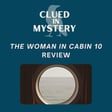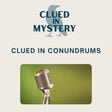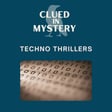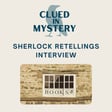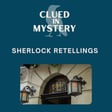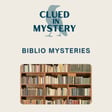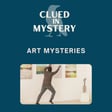Introduction to Poisons in Mystery Fiction
00:00:11
Speaker
Welcome to Clued in Mystery. and I'm Sarah. And I'm Brooke, and we both love mystery. Brooke. Hi, Sarah. In today's show, we're excited to launch a brand new recurring topic discussing the many murder methods used in mystery fiction.
00:00:30
Speaker
This is going to be such a fun thing to explore, I think. That's right. Today we're going to talk about poisons.
Why is Poison a Discreet Yet Risky Method?
00:00:38
Speaker
And poison is an often used fictional murder method offering both advantages and drawbacks for would-be fictional killers.
00:00:47
Speaker
On the plus side, it's discreet. A shooting is loud, a stabbing is messy, but poison is quiet and covert. Poison as the murder weapon also carries risks.
00:00:59
Speaker
Symptoms can take time to appear, giving the victim a chance to alert others, and modern science can sometimes trace poisons back to their source with alarming accuracy. In Golden Age Mysteries, poison became almost an art form.
00:01:14
Speaker
Little wonder this era was also known as the Golden Age of Poisons. Agatha Christie used toxins as the murder weapon in over half of her novels. She had trained as a pharmacy assistant during World War I and had detailed knowledge of the dangers of certain substances.
00:01:31
Speaker
That background gave authenticity to her novels and poison became her signature.
Real-Life Poison Usage in the Golden Age of Mysteries
00:01:37
Speaker
But she wasn't the only mystery author using the method regularly in stories.
00:01:42
Speaker
ah Other Golden Age mystery authors did too. We also find a vivid history of real-life poison use. In the 1920s and 30s, poisons like arsenic, cyanide, and wood alcohol were common ingredients in everyday products.
00:01:58
Speaker
Without proper regulation, a bottle on the kitchen shelf could be deadly, whether through accident or design. Today, while poison murders are much more rare, they still captivate us, maybe because they represent the ultimate quiet betrayal.
The Allure of Poison for Authors
00:02:15
Speaker
In today's episode, we'll dig deeper into the world of poisons, the fictional classics, some real-life cases, and why this method continues to haunt mystery fiction even today.
00:02:27
Speaker
So to begin, Sarah, let's expand on what makes poison such an often-used method for fictional murders. Thanks for that explanation and summary, Brooke.
00:02:39
Speaker
So one of the things that I think makes poison a great method is it allows for the killer to have an alibi, right?
00:02:50
Speaker
It can be slow acting. So you could administer a poison, say, in someone's food or drink, right? And you don't even have to be there when they get sick, right? It could be hours or days later that they that they start to show symptoms. And if you're the poisoner, you've got lots of chance to distance yourself from that crime.
00:03:13
Speaker
Yeah, that is a great point. That's that ah slow burn tension. And readers think about everyone else who had access at the same time, right?
00:03:25
Speaker
Like who poured the tea? Who handled the medicine? um Because there is that longer drawn out scenario, lots of people came in contact with the the victim before knowing who was the poisoner, as
Poison in Cozy Mysteries and Author Research
00:03:38
Speaker
you said. So I think that's great.
00:03:39
Speaker
It also is um kind of a calling card of that closed circle, isn't it? Because um for instance, if the poisoning happened at a dinner, you know, well, these six people that were sitting at the table are probably our our culprit.
00:03:56
Speaker
Yeah, exactly. And I think another reason that poison can be really popular with authors is that it's super accessible, right? You mentioned that common household items can be poisonous, even if at their intended use, they're not poisonous. But if, um you know, I think about eye drops, for example, you put them in your eyes, they're fine. You put them in someone's drink and that.
00:04:25
Speaker
you get some pretty horrendous results. Exactly. And especially for a historical novel or, um the actual books that were set in the golden age, those substances were even much more readily available, as I mentioned.
00:04:42
Speaker
And so it's not hard to believe that somebody could take one of those regular household items and, administer it to the victim. Well, and and lots of plants are poisonous, right? So people would have poison gardens or just things growing in their gardens that are beautiful, but not so great if you ingest.
00:05:08
Speaker
Mm-hmm. Mm-hmm. I think we see poisoning a lot in the traditional or cozy mysteries because, um as I mentioned, it it's easier to describe as less of a gory death.
00:05:22
Speaker
um you know A shooting is bloody, a stabbing is bloody. And in typically cozies or traditional mysteries, the the violence level should be
Calculated Nature of Poisonings and Historical Cases
00:05:31
Speaker
really low. And so I think this makes authors lean towards something like poisoning where you can keep it a little, quote unquote, cleaner.
00:05:39
Speaker
However, I was thinking about how we probably are kind of thinking of the Bugs Bunny version of a poisoning death because in real life, it's not so pretty.
00:05:50
Speaker
um so do you remember the conversation that we had with Jessica Thompson? And and she writes cozy mysteries. And she said there are some poisons that she won't use because she likes to be authentic in her stories. And and there are some that are just so horrific that um and she just can't put them in her books.
00:06:10
Speaker
Right, right. and I think that um the sort of gift that Agatha Christie had with her background and training, ah most of us don't have that knowledge. So I think authors need to be careful and they don't just be like, oh, well, and he killed her with cyanide. You know like you need to do that research and figure out what are those symptoms going to be? What's the timeline?
00:06:31
Speaker
Yeah. And some authors do that better than others. You mentioned real life poisonings. And there were a couple that came to mind for me. um Every now and again, you'll see in the news, a story of a office where someone's water bottle has been poisoned by a colleague.
00:06:52
Speaker
And, you know, you just think like,
00:06:58
Speaker
One of the things that I associate with poison in mystery fiction is it's often used in revenge because, as you said, it can be something that takes time.
00:07:10
Speaker
It's something that the poisoner has really thought about. Although here's it there's this distance between the killer and the victim, it's also so pre-planned, premeditated and thought through.
00:07:24
Speaker
It almost makes that killer a little more vicious in my mind because they the planning is extreme in these, right?
Political Espionage and Fictional Inspiration
00:07:31
Speaker
It's never going to be a spur of the moment. I get angry and, you know, stab them with the letter opener. You know, it's not that kind of a murder.
00:07:39
Speaker
No, i I agree. And that's why I think when I think about like the real life poisonings of people's water bottles in the fridge, like the amount of thought that someone has gone into to to do that and to continue to be in the same office as this person and rather than just firing off an angry email or some other way of dealing with what I assume is just frustration ah right in the office, which we all experience.
00:08:07
Speaker
But, um yeah, to like have that thought and and go through with with actually um harming someone that way. And, you know, part of the reason why Golden Age authors were so inclined to use poison as a murder weapon were the true crime stories circulating in newspapers. We've.
00:08:25
Speaker
discussed before that um many of those authors took real life cases and then morphed them into their murder mysteries. Marianne Cotton was um a woman in the 19th century England who was convicted of murdering her husbands.
00:08:40
Speaker
Yes, that's plural. And children with arsenic to collect insurance money. And then Graham Young was known as the teacup poisoner in the 1960s England.
00:08:52
Speaker
He was obsessed with poisons from a young age, and he poisoned co-workers' tea, just like you mentioned. um This was to test out the different substances. He was using his co-workers as guinea pigs.
00:09:04
Speaker
And then Belle Guinness, she lived in Indiana in the early 1900s, and she likely used poison to subdue her victims before doing other violent acts. So these true crimes were in the newspapers and in the media of the day and acted as like, you know, seeds for some of the stories.
00:09:27
Speaker
Another place that we see poisonings happening in real life is in um you know, political espionage, right? You think about ah in Salisbury, UK in 2018, when when ah several people were poisoned um with Novichok, which is a a nerve agent.
00:09:51
Speaker
um And It was, you know, on ah door handles that that they had touched. ah So there were, it was, ah I think, a father and daughter.
00:10:03
Speaker
the father was a former Russian military officer and a double agent providing intelligence to the British. And his daughter were both poisoned. um And then a police officer was also poisoned um as a result of the the exposure that they had.
Classic Books Featuring Poison
00:10:22
Speaker
Yeah, that's a great point that, you know, we're kind of talking about traditional and cozies, but poisons are definitely used in more higher action type mystery, mystery thrillers, definitely like spy thrillers.
00:10:35
Speaker
ah What your story reminded me of the 2001 Anthrax. issue in the United States where anthrax spores were deliberately mailed to u s officials.
00:10:47
Speaker
um So, yeah, it it isn't just a cozy method, even though I think that that's kind of what a lot of people think or like, um you know, the stereotype that it's a female type of murder method.
00:11:00
Speaker
yeah Yeah, it definitely has that association with ah female killers um because it's a cleaner ah method.
00:11:11
Speaker
And for some of the reasons that we that we talked about earlier, right, you don't have to be present. It doesn't require that physical violence, um but it certainly requires that forethought and planning.
00:11:24
Speaker
you know Another reason why this is such a great method for a murder mystery is because it appears when someone dies of poison, a lot of times that it was just natural causes.
00:11:36
Speaker
Like they had a heart attack. They just you know got ill and passed away slowly. And that works really well because then you have the detective or the medical examiner or somebody saying, oh, this was natural causes.
00:11:49
Speaker
The amateur sleuth can come in then and say, you know what? Something's up. Something's sneaky here.
00:11:57
Speaker
So shall we discuss some examples of um some of the stories that we've read or films that we've watched that have poison at the center of the story? Yeah, I think that's a great idea, Brooke. um The first one that I had on my list is The Poisoned Chocolates Case by Anthony Berkeley, and that was published in 1929. And I think we talked about that in our episode that we did about him.
00:12:22
Speaker
We did, but I did not think of that um in leading up to this episode. That that is a great ah example. I'm glad that you brought up a male author as well because the list of authors that kind of pop up if you look for Golden Age authors who write about poisons are Dorothy L. Sayers, Marjorie Allingham, Niall Marsh.
00:12:41
Speaker
um So you know we have to acknowledge that the men writing ah in that era were also using the same poison as their method. And speaking of Dorothy L. Sayers, the book that came to my mind right off the bat was Strong Poison. um This is when Harriet Vane is accused of poisoning her former lover, and Lord Peter Whimsey comes in to prove that she's innocent. And it's a good thing he does because later they are free to fall in love and get married.
Impact of Poison in Dual-Timeline Stories
00:13:13
Speaker
ah So one book that I enjoyed that features poison is The Lost Apothecary by Sarah Penner. um And this was published in 2021.
00:13:24
Speaker
And it is a dual timeline story. So there's a story in present day and then a story happening in i think it's 18th century London. um And it's A little light on the mystery, but ah it was it was quite good.
00:13:42
Speaker
um And it was, you know, about this woman in the past who would secretly dispense poisons to women um who needed to get out of difficult situations, you know, difficult marriages or difficult relationships.
00:13:57
Speaker
Oh, interesting. I vividly remember that cover. It was a very popular book, um but i didn I haven't read it, but i I think I need to put it on my list. I love dual timelines and I love that idea that somebody was kind of helping out these women.
Innovative Use of Poison in 'Knives Out'
00:14:14
Speaker
I also wanted to mention ah movies, and I immediately thought of the Knives Out franchise because so far there have been two movies and um poison has been key in both of them. And I also think that Rian Johnson, the writer and director, has done an amazing kind of twist on the idea of poisons in both of these for different reasons.
00:14:38
Speaker
ah With Knives Out, it um and spoiler alert we're going to talk about some key points of these both of these movies but it's an accidental poisoning by medication, or is it So here's the idea of a medication, something healing that can turn into poison when given in the wrong dosage or in the wrong order.
00:15:00
Speaker
Um, and it's like what you mentioned earlier, it's a substance that's not necessarily toxic in and of itself, but when used in a certain way. Um, and then in the glass onion movie, the toxin is something that is an allergic reaction.
00:15:18
Speaker
So there again, this is not like a chemical man-made substance that is poisonous but it um is poisonous to this particular person.
Visual Depictions of Poison in Media
00:15:27
Speaker
So there we have that cunning and that planning.
00:15:30
Speaker
And i will just say, if you haven't seen that movie, the actual administering of the poison is genius. It's a great moment in the movie. So um I'm anxious to see if Rian Johnson continues to play with this because I like how he's sort of hiding or um putting a twist on the idea of poisonings.
00:15:53
Speaker
I think those are great ah recommendations. And I'd forgotten um about the that kind of accidental poisoning, Brooke. um Another book that came to mind, and this one also has a beautiful cover, is A Botanist's Guide to Parties and Poisons by Kate Kavari. And that was published in 2022.
00:16:15
Speaker
And it's a ah historical mystery. I think it's in the 1920s. And it's a female sleuth who is ah well versed in and studies botany and the, you know,
00:16:31
Speaker
poisonous plants that um that we can find in nature. That's fascinating. I love the idea that you brought up earlier about the poison garden. um And you know different authors have used that in different ways.
00:16:45
Speaker
One of the recent portrayals I remember of a poison garden is in Kenneth Branagh's A Haunting in Venice. which you will not find in the Agatha Christie book that this movie is based on. However, i thought it was a really great part of that story and the actual visual um of the poison garden was a lot of fun.
Conclusion and Excitement for Future Episodes
00:17:09
Speaker
Well, Brooke, I think this has been so fun to talk about poisons and I look forward to continuing to talk about different methods in future episodes. I do too. We'll have to decide which murder method we will discuss next.
00:17:25
Speaker
But for today, listeners, thank you for joining us on Clued in Mystery. I'm Brooke. And I'm Sarah. And we both love mystery. Clued in Mystery is written and produced by Brooke Peterson and Sarah M. Stephen.
00:17:39
Speaker
Music is by Shane Ivers. If you liked what you heard, please consider telling a friend, leaving a review, or subscribing with your favorite podcast listening app. Visit our website at cluedinmystery.com to sign up for our newsletter, The Clued in Chronicle, or to join our paid membership, The Clued in Cartel.
00:17:55
Speaker
We're on social media at Clued in Mystery.

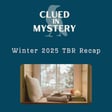
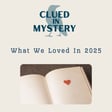
![[Re-release] Anthony Berkeley image](https://media.zencastr.com/cdn-cgi/image/width=112,quality=85/image-files/61e1c276e3ec42007857cff9/e7c778ac-a2ba-4809-9a5c-7cd39d167834.jpg)
![[Bonus] Wake Up Dead Man image](https://media.zencastr.com/cdn-cgi/image/width=112,quality=85/image-files/61e1c276e3ec42007857cff9/e276ac32-e664-464f-956c-7699bdb60aa5.jpg)
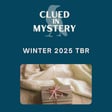
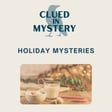
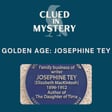
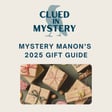
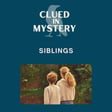

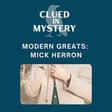
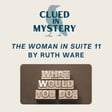
![[Bonus] Read Along: Daughter of Time image](https://media.zencastr.com/cdn-cgi/image/width=112,quality=85/image-files/61e1c276e3ec42007857cff9/b953ad72-c43e-48ca-a18a-b3c216ab90ee.jpg)
